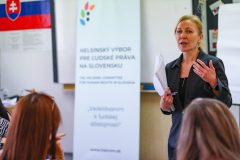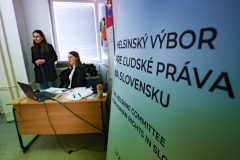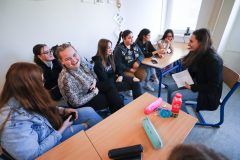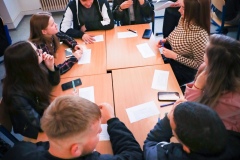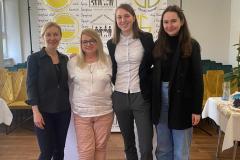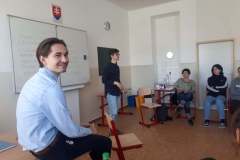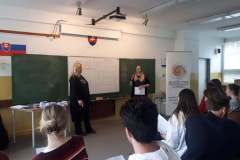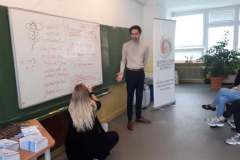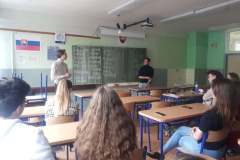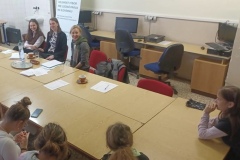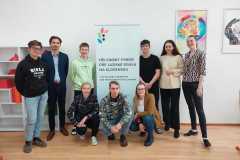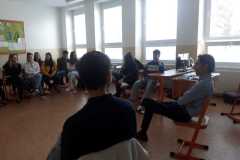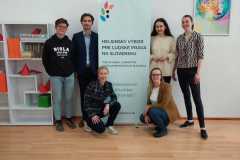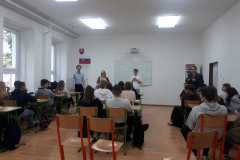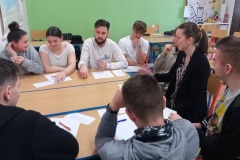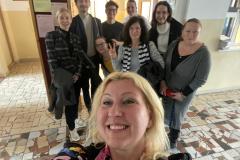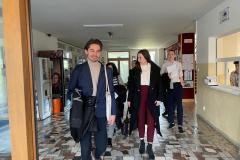
Support of human rights education and training in secondary vocational schools
The Helsinki Committee to Youth project was created with an aim to spread the values of democracy and tolerance based on respect for human dignity among young people in Slovakia. We understand the need to build bridges between different opinions and thus reduce the polarization of society. Peace is not possible in a society that does not respect the dignity of other people. It is peaceful coexistence that is inevitably connected with education of human rights and democratic values, because only by respecting the rights of the other person can we overcome our differences.
The project is conducted in 7 secondary vocational schools, where 2 events consisting of interactive workshops take place. It is precisely these schools that have a disproportionately smaller amount of time in the curriculum for discussing topics related to democracy and human rights. Most of these activities are taking place in grammar schools, and secondary vocational schools are often unable to provide opportunities for their students to get a deeper education in the given fields.
Our goal is to educate young people for active democratic citizenship. In the form of experiential interactive education, we want to eliminate prejudices and stereotypes that we often have. In addition, the initiative came from the teachers themselves, who perceived a deficit in education in the field of human rights and democracy, especially after the long months of the pandemic, when students did not have many opportunities to discuss the given topics.
Primarily regions and districts where the coverage of these topics was minimal or even absent, or so-called “grey places”, were selected. Through workshops and discussions with students, we also want to map human rights awareness among high school students in various regions of Slovakia.
Education is complemented by the creation of teaching materials for secondary school teachers and students. We also provide teachers with the opportunity to participate in an educational event during which they can acquire new teaching skills in the field of interactive education about human rights and democracy. The output of the project will be a publication focusing on the level of awareness of human rights topics and the perception of the quality of democracy among secondary school students.
We also decided to involve university students in the realization of the workshops, who are close in age to the high school students, and thus can better understand the problems these young people encounter. The intention is to conduct a stimulating and constructive discussion with young people, as many share the feeling that they often do not have the space to express their fears and concerns about the current socio-political situation.
We perceive the need to give more space to young people to express themselves, to listen to what troubles them and what problems they want or have to solve. It is necessary to have a discussion with young people, ask for their opinions and create a space where they will feel heard. After all, how else do we want to build a generation of committed people who care about the future of our country?
The project is carried out in cooperation with the Ministry of Justice of the Slovak Republic.
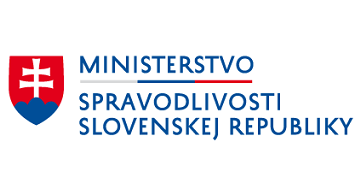
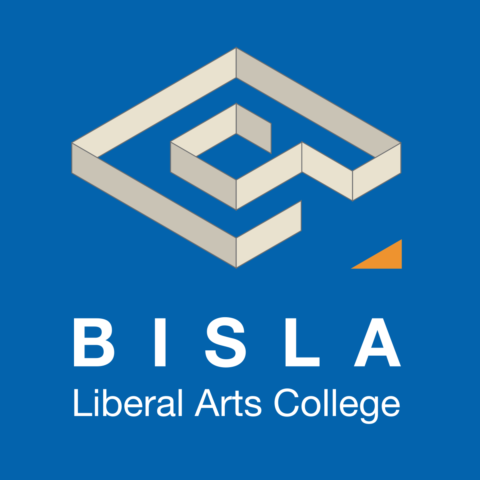
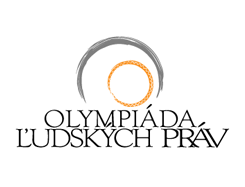
Do you have time and would you like to test your human rights knowledge? Then try these few links!
https://www.un.org/en/academic-impact/unai-quiz-human-rights
https://quizizz.com/admin/quiz/5afb367a57663a001a370139/human-rights
Videos:Human Rights in 2 minutes
https://www.youtube.com/watch?v=ew993Wdc0zo –
https://www.amnesty.org/en/latest/education/2015/05/10-best-human-rights-videos/
Do you like reading about inspiring people? These few stories about young human rights activists are definitely worth reading!
The European Parliament’s unique Equal? – Human Rights project has produced a range of materials, from individual sample stories, historical events and discussion questions. Primarily created for teachers who can distribute the content to pupils as teaching material.
The Expose and Defeat Disinformation project created by the European Union offers materials not only for teachers but also for students. Through examples from the online environment, but also through interactive activities, students analyse the credibility of different information.
https://learning-corner.learning.europa.eu/learning-materials/how-spot-and-fight-disinformation_en
This website provides several thematically separated activities and teaching materials. Concepts such as democracy, solidarity, migration and solidarity are explained to younger grades.
https://atlasofeuropeanvalues.eu/materials.html
Several teaching materials are provided by the EU:
https://learning-corner.learning.europa.eu/learning-materials_en?f%5B0%5D=topics_topics%3A6
As part of the Helsinki Youth Committee project, a survey was conducted on the perception of high school students on democracy and human rights issues, as well as their knowledge of on the issues. Despite considerable interest in the political behaviour of young people in Slovakia, we found that we have surprisingly little knowledge about it based on previous research. Special mention should be made of the Youth Council of Slovakia1, which regularly monitors the values of young people. Among their main findings is that young people do not question democracy as such, but have a shallow knowledge of its basic principles. In practice, this means that although formally the vast majority of respondents describe democracy as the best system, when asked additional questions about its aspects they are seemingly not so convinced. As research by the Institute for Public Affairs documents, this trend can be seen across the population. Although the majority of Slovenes believe that democracy is the best political system, a supermajority also believe that the country needs discipline and order instead of human rights. In sociological parlance, this is called “cognitive dissonance” or, more expressively, “cognitive crash”. Our aim was to find out how widespread these cognitive crashes are among secondary school students in the context of democracy and human rights. We considered that in this process it is important to focus not “only” on their value settings, but also on their level of knowledge in the areas concerned. Simply put, we were not “only” interested in whether young people support liberal democracy, but we also wanted to find out whether they know what liberal democracy means. We were also interested not “only” in how high school students relate to human rights on a theoretical level, but also in whether they understand the concept.

